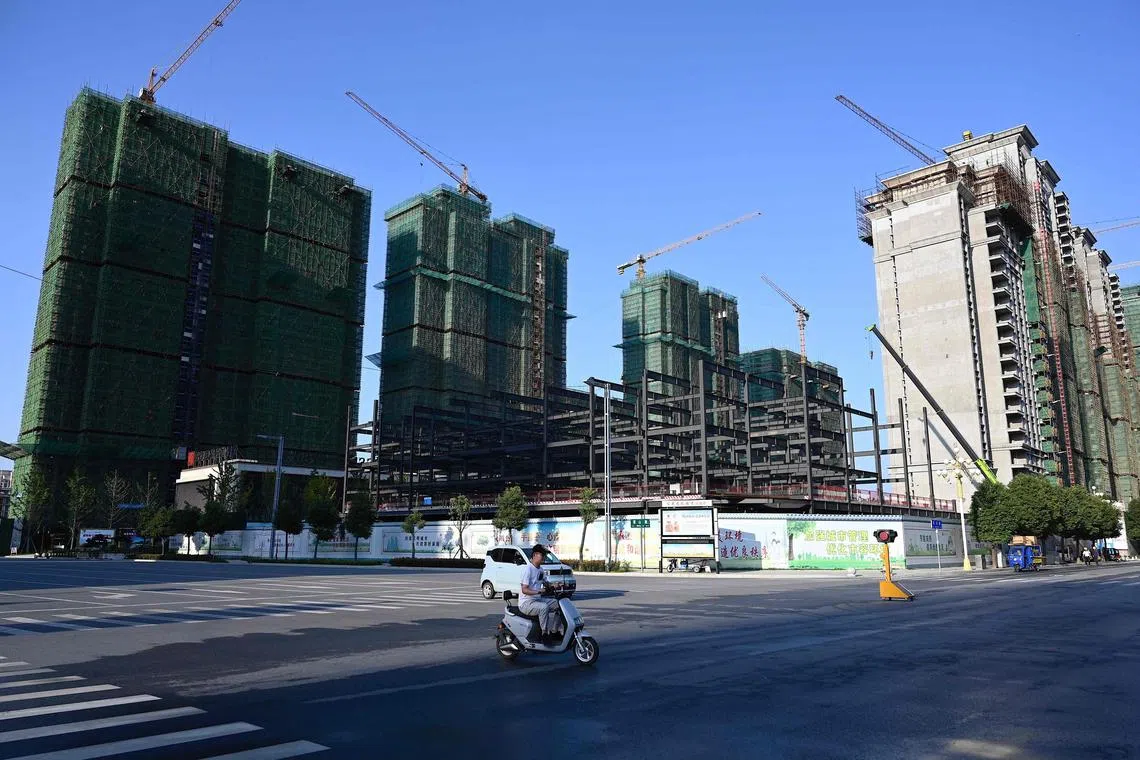China property rebound fizzles, raising risks to economic recovery
Sign up now: Get ST's newsletters delivered to your inbox

High-frequency indicators in recent weeks show that momentum in China's home purchases has fizzled.
PHOTO: AFP
BEIJING – China’s housing market is regressing after a brief recovery, underscoring the challenges in the world’s second-largest economy.
Signs of weakness are emerging after housing sales and prices recovered briefly
China’s property sector is key for the economic growth outlook this year as it accounts for about 20 per cent of the country’s gross domestic product after including related industries.
High-frequency indicators in recent weeks show that momentum in home purchases has fizzled out. Property investment also continues to contract, and consumers are reluctant to take out mortgages. This is despite Beijing rolling out a slew of measures
“After a short-lived recovery in February and March, the release of pent-up demand for home purchases has come to an end,” said Dr Lu Ting, Nomura Holdings’ chief China economist. “The property recovery this year will be only moderate.”
The fate of the sector also weighs on the global economy as it helps drive demand for commodities like iron ore and copper. After a bullish start to 2023, iron ore – used in steelmaking – has dropped below US$100 a tonne, largely because of the subdued demand for Chinese home building.
Here are five warning signs from recent housing market data:
1. New homes
Home sales were dismal over the five-day Labour Day break in May, the first long holiday since China abandoned pandemic restrictions and infection waves eased. New home purchases in 40 major cities tracked by data provider China Index Holdings were 22 per cent below pre-pandemic levels in 2019.
Compared with last year, sales were up 25 per cent – but that was mainly due to the low base of comparison with 2022, when Shanghai and other cities were in lockdown.
The four mega cities, which include Shanghai and Shenzhen, showed a sustained recovery, with new residences sold rising 59 per cent by area from pre-pandemic levels. In regional centres and smaller cities, sales plunged 28 per cent and 42 per cent respectively.
2. Existing homes
In the existing home market – which is less distorted by seasonal factors linked to the launch of developers’ projects – sales were even worse. In the first four days of May, sales plunged 44 per cent by area from a month earlier, according to brokerage Zhongtai Securities, which tracks 15 major cities with active existing property sales. This compares with a 61 per cent surge in February when the market showed signs of a turnaround for the first time.
3. Unstable prices
The decline in prices of existing homes started to widen again from March, reaching a four-month high in April, according to data from China Index Holdings (CIH).
Pricing is less controlled by the government in this part of the market than in new homes. Among 100 cities tracked by CIH, existing home values fell in 76.
New home prices were barely changed in April from the previous month. That said, new home prices could soon follow suit as more cities see a price decline.
4. Mortgage slowdown
The outstanding amount of individual mortgages had the smallest increase on record in the first quarter compared with a year ago, reflecting households’ reluctance to add debt. Demand for home loans is weak due to consumers’ pessimistic outlook for income growth, concerns about delays in new projects, and a shift in views about the long-term value of the sector.
5. Property investment
Investment in real estate contracted at a faster pace in March than in the previous month, snapping an improving trend since the end of 2022. This suggests the rebound in home sales earlier this year has been insufficient to shore up confidence among developers, who have been scaling back land acquisitions. BLOOMBERG


